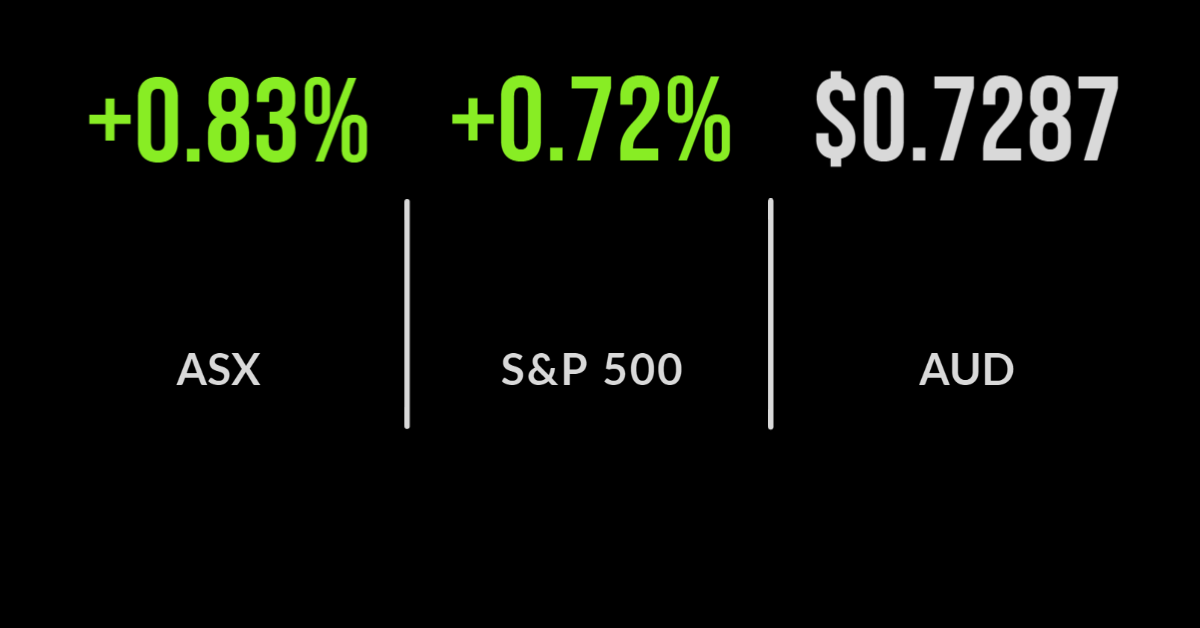ASX closes 0.8% higher as big miners bounce back
ASX down 0.2 per cent, unemployment surprise, iron ore rallies
The S&P/ASX200 (ASX: XJO) finished the week on a stronger note, gaining 0.8 per cent behind a strong recovery in the mining sector, which gained 2.3 per cent.
The likes of Fortescue (ASX: FMG) and BHP (ASX: BHP) added 2 and 2.8 per cent respectively on the back of a rise in the iron ore price after the Chinese Government indicated support for the embattled property sector was on its way.
Every other sector was higher apart from healthcare which continues to see capital rotate out of companies with defensive earnings into more volatile cyclicals.
Zip Co (ASX: Z1P) gained close to 4 per cent after announcing they had settled on their purchase of Twisto, a European digital payments player that will support an expansion in the region.
Shares in Link (ASX: LNK) were also up 3.5 per cent after the group received an offer for their poorly timed loan servicing business in Europe.
The day’s strength couldn’t overcome a mainly negative week with the market falling 0.2 per cent over the five days as the inflation risk rumbled through valuations.
Materials were the standout, gaining 4.7 per cent with those linked to renewable energy, like Chalice (ASX: CHN), which added 44 per cent, and gold mining including Evolution (ASX: EVN), up 12 per cent, the leaders.
Every sector apart from mining finished lower over the five days, with technology and healthcare the hardest hit on concerns of higher interest rates impacting valuations.
US markets finish strongly, Johnson & Johnson, Toshiba join break up
US markets posted a strong finish to the week with all three benchmarks gaining, but once again led by the technology sector, with the Nasdaq gaining 1 per cent despite concerns about higher bond yields on valuations.
The Dow Jones and S&P500 also added 0.5 and 0.7 per cent respectively with the communications sector outperforming.
Both secular growth in the form of technology and consumer businesses, and cyclical growth in the form of commodities are proving resilient, with defensives including healthcare underperforming.
Over the week all three benchmarks were down, 0.6, 0.3 and 0.7 per cent respectively with the breaking up of conglomerates the most powerful trend.
Johnson & Johnson (NYSE: JNJ) and Toshiba (TYO: 6502) joined General Electric (NYSE: GE) in deciding to split their businesses.
In the case of Johnson & Johnson the consumer and pharmaceutical divisions will be separated with brands like Band Aid and Listerine separated from their medical device business; both companies will be among the largest of their kind in the world.
Toshiba is attempting a similar change, breaking out their energy infrastructure, semiconductor and memory chip businesses.
The results were mixed with Toshiba down over 1 per cent, Johnson & Johnson over 1 per cent higher and GE broadly flat.
Unemployment, inflation, crypto nears mainstream
There was no end to the superlatives this week as both domestic employment and US inflation results left economists ‘stunned’.
Starting at home, Australian unemployment jumped significantly from 4.6 to 5.2 per cent with close to 50,000 people losing their jobs, the opposite of the predicted 50,000 job gains expected by leading economists.
Whilst the massive miss was blamed on the timing of the survey, it highlights a growing issue facing policymakers and the economy in general, being how healthy is the ‘real economy’ and could it withstand the rate hikes many are predicting.
The story is similar to the US, where inflation printed at close to 1 per cent in October, charting an annual rate of 6.2 per cent, the largest in several decades.
There are clearly many stories at play, with used cars, fuel, property prices and now groceries adding to the price increases.
Central banks continue to view this as ‘transitory’ with the missing piece being how long transitory actually lasts.
Supply chain issues continue to dog the hopes of any sustained recovery with demand still well below pre pandemic levels.
The cryptocurrency sector is knocking on the door of the mainstream, with a number of related exchange traded funds listing on the Australian market.
At this point, regulators have a hold on any products that track the daily traded price of Bitcoin or other digital currencies, but this hasn’t stopped a range of associated products including Crypto Innovators, and Bitcoin Futures (NYSE: BITO) from attracting record levels of capital.







